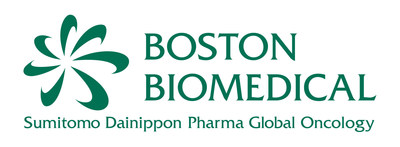

CAMBRIDGE, Mass., Jan. 18, 2017 /PRNewswire/ -- Boston Biomedical, an industry leader in the development of novel compounds designed to target cancer stemness pathways, will feature data from two clinical studies for its lead investigational compound, napabucasin, at the 2017 ASCO Gastrointestinal Cancers Symposium, held from January 19-21, in San Francisco.

Napabucasin is an orally-administered investigational agent designed to inhibit cancer stemness pathways by targeting STAT3.i Cancer stem cells (CSCs) possess the property of stemness – the ability to self-renew and differentiate into heterogeneous cancer cells. This allows the CSCs to act like seeds, causing a patient's cancer to relapse or spread within the body.ii,iii In preclinical studies, the STAT3 pathway was identified as an important pathway for maintaining cancer stemness.
Data from the two studies will be presented as poster presentations on January 21. The studies evaluate anti-cancer activity of napabucasin in combination with FOLFIRI with and without bevacizumab in patients with metastatic colorectal cancer (CRC), including treatment-naïve patients and patients previously exposed to FOLFIRI regardless of pSTAT3 status, and safety and anti-cancer activity of napabucasin in combination with panitumumab in patients with K-ras wild type metastatic colorectal cancer (mCRC).
Planned data posters include:
Saturday, January 21, from 7:00 AM – 7:55 AM and 12:30 PM – 2:00 PM PST; Moscone West Building
About Napabucasin
Napabucasin is an orally-administered investigational agent designed to inhibit cancer stemness pathways by targeting STAT3.i
Napabucasin is currently being investigated in multiple Phase III studies, including gastric and gastroesophageal junction (GEJ) (NCT02178956), colorectal (NCT02753127) and pancreatic cancer (NCT0299373). It is also being investigated in earlier phases in multiple solid and hematologic malignancies, including tumors of the lung, liver, pancreas and brain. In 2016, the U.S. Food and Drug Administration granted Orphan Drug Designation for napabucasin in gastric/GEJ and pancreatic cancer.
More information on napabucasin and ongoing clinical trials can be found at www.BostonBiomedical.com.
About Boston Biomedical
Boston Biomedical, Inc. (Founder, President, CEO and CMO: Chiang J. Li, M.D. FACP) was founded in November 2006 and is wholly owned by Sumitomo Dainippon Pharma Co., Ltd. Boston Biomedical's mission is to develop the next generation of cancer therapeutics by creating drugs designed to target cancer stemness pathways. Boston Biomedical's innovation in drug discovery has received a number of recognitions and awards in the United States, including the Frost & Sullivan 2010 North American Drug Discovery Technology Innovation of the Year Award, the National Cancer Institute (NCI) cancer stem cell initiative grant award in 2010, and the 2011 Biotech Pioneer Award at the Alexandria Oncology Summit. The company also received the "Company To Watch" award in the 10th Annual Team Massachusetts Economic Impact Awards in 2013. Boston Biomedical is headquartered in Cambridge, Massachusetts, USA.
Additional information about the company and its product pipeline can be found at www.BostonBiomedical.com.
Disclaimer Regarding Forward-Looking Statements
The forward-looking statements in this press release are based on management's assumptions and beliefs in light of information presently available, and involve both known and unknown risks and uncertainties. Any forward looking statements set forth in this press release speak only as of the date of this press release. We do not undertake to update any of these forward-looking statements to reflect events or circumstances that occur after the date hereof. Information concerning pharmaceuticals (including compounds under development) contained within this material is not intended as advertising or medical advice.
For general inquiries:
Boston Biomedical
617-674-6800
For media inquiries:
Sara Baker
CHAMBERLAIN PR
212- 849-9474
sara.baker@inventivhealth.com
i Li Y, Rogoff HA et al. PNAS. 112(6):1839-44, 2015.
ii Gupta PB, Chaffer CL, Weinberg RA. Cancer stem cells: mirage or reality? Nat Med. 2009;15(9):1010-1012.
iii Ajani JA, Song S, Hochster HS, Steinberg IB. Cancer stem cells: the promise and the potential. Semin Oncol. 2015;42(suppl 1):S3-S17.
SOURCE Boston Biomedical Pharma, Inc.